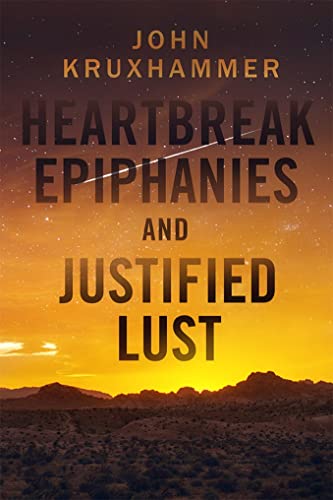In the opening paragraph of HEARTBREAK EPIPHANIES AND JUSTIFIED LUST, author John Kruxhammer reveals his poetic focus on purpose and rhyme, which comes to define the rest of the work. With philosophical dilemmas and considerations defining Wilson’s life as a philosophy professor, the reader experiences a slight estrangement from the immediacy of experience. However, this distancing is contrasted by an equally potent preoccupation with carnal matters, from seductions to the longings of the heart. Sadly, traces of artifice manage to sneak in through the lofty stalling of life’s most propulsive moments, “Passions are basically feelings accompanied by pleasure or pain. Virtue, or character, is determined by the proportion of passion in a particular situation, reflecting an individual’s true disposition and the amount of choice one consciously exercised over the passions.” This, inevitably, leaves the reader’s mind straying from the thought that first prompted its own anatomization.
Even the characters’ various desires and dalliances take on the structure of an oration. John Palmer, a philosophy student who suddenly finds himself in the throes of a romantic and sexual obsession with his therapist, calls on reason to rally against the innateness of his physicality, “his body contorted by the irrational urgency of copulation, despicable surrender to base instinct.” This wrangle with nature points to an emotional intensity rooted in philosophical polemics, leading the author to experiment with a familiar narrative, and ultimately dull its sharpness. While Palmer’s sensitivity is compelling, and coincidentally allows for a smoother integration of intellectual ideas into the narrative, his proclamations seem too performative to be genuine, “I live at the dawn of struggle (…) And suffocate in the twilight of conformity.” The lyrical inundation of adjectives gives a similar impression, particularly when its musical intensity grows overpowering, “Obsession with an unreachable beautiful compassionate woman is a brutal demented disaster.” And while the author’s delight in the poetics of language is infectious, lengthy streams of thought inevitably thwart the advancement of the story, proving too protracted to graze the reader’s senses, keeping the novel’s appeal drifting between the deliberate and the indeterminate. As a result, there appears to be no tangible story to cling to, at least not until the men’s narratives intersect in Las Vegas. Linguistically speaking, however, rhythmic frenzy manages to spill over into the novel’s refrain, igniting the fever from which “no excellent soul is exempt.”
John Kruxhammer’s HEARTBREAK EPIPHANIES AND JUSTIFIES LUST fuses intellect with the body, conveying the madness that comes from trying to rationalize, and command, the urges of both flesh and spirit.
~Neil Czeszejko for IndieReader

